A
Literary Saloon
&
Site of Review.
Trying to meet all your book preview and review needs.
| Main |
 |
| the Best |
| the Rest |
| Review Index |
| Links |



to e-mail us:

support the site
Against Nature
by
Tomas Espedal
general information | review summaries | our review | links | about the author
| Title: | Against Nature |
| Author: | Tomas Espedal |
| Genre: | Novel |
| Written: | 2011 (Eng. 2015) |
| Length: | 203 pages |
| Original in: | Norwegian |
| Availability: | Against Nature - US |
| Against Nature - UK | |
| Against Nature - Canada | |
| Against Nature - India | |
| Contre la nature - France | |
| Wider die Natur - Deutschland | |
| Il corso innaturale delle cose - Italia |
- The Notebooks
- Norwegian title: Imot Naturen
- Translated by James Anderson
- Return to top of the page -
Our Assessment:
A- : raw autobiographical/love story
See our review for fuller assessment.
| Source | Rating | Date | Reviewer |
|---|---|---|---|
| NZZ | . | 3/6/2014 | Andreas Breitenstein |
| Die Zeit | A+ | 24/4/2014 | Iris Radisch |
From the Reviews:
- "Tomas Espedals Bekenntnis-Buch scheut weder die grossen Fragen noch die kleinen Gefühle. Selbst wenn man die Selbststilisierung abzieht, beschreibt es mit zärtlicher Gewalt das Glück und den Schrecken, die dem erotischen Begehren zwischen Hingabe und Autonomie, Unterwerfung und Macht, Erlösung und Schuld innewohnen. (...) Das ist ein aufrichtiges Buch, Leser, schonungslos in seiner Klarheit und unwiderstehlich in seiner Verletzlichkeit." - Andreas Breitenstein, Neue Zürcher Zeitung
- "Es wird das ehrlichste und berührendste Buch über die Liebe, das man sich denken kann, weil es nicht nur von der einen literaturfähigen Zentralliebe erzählt, für die Romanhelden der klassischen Literatur üblicherweise mit ihrem Romanleben bezahlen (Werther, Anna, Effi, Emma und viele andere). Sondern weil es um die wirkliche Liebe geht, die außerhalb der Romane bei erwachsenen Menschen heutzutage eher im Plural vorkommt. (...) (E)in Meisterwerk des literarischen Understatements." - Iris Radisch, Die Zeit
Please note that these ratings solely represent the complete review's biased interpretation and subjective opinion of the actual reviews and do not claim to accurately reflect or represent the views of the reviewers. Similarly the illustrative quotes chosen here are merely those the complete review subjectively believes represent the tenor and judgment of the review as a whole. We acknowledge (and remind and warn you) that they may, in fact, be entirely unrepresentative of the actual reviews by any other measure.
- Return to top of the page -
The complete review's Review:
Against Nature is, like its predecessor, Against Art, barely even veiled as fiction.
It begins with the beginning of a love-affair, the forty-eight year-old Tomas hooking up with a much, much younger woman at a New Year's Eve celebration, almost immediately professing his love for her ("It's too early to say that sort of thing", she says).
She's hesitant -- "I can't see you again", she says at one point, leery of where this might be leading so fast -- and this opening section, describing only that first encounter, is inconclusive; it is only much later in the novel that the narrator returns to this relationship, and what became of it.
This opening section begins in the first person -- with the admission: "I'm starting to grow old; I don't recognize myself." -- but quickly switches to a different perspective, the narrator distancing himself from what actually happened by replaying the event as through a camera lens, an outside observer: "He rests. He is content. He's sitting in a chair", he writes, the person he was perhaps unrecognizable in that same way he finds "I don't recognize myself" when he sees his mirror-image.
No names are affixed to the two figures whose encounter he describes.
It is just he and the much younger she and their moments of intimacy and conversation, where:
All at once he feels acutely tender towards her, holds her, feels her trembling, he runs his hands through he hair, kisses her cheek, as if she's already his girlfriend, his closest and most beloved, it happened so quickly, so unexpectedly and powerfully, he didn't know how much he yearned for her, how much he needed her.In describing that encounter, he turns away from it too and tells of another, a literary parallel, the story of Peter Abélard and his love for the girl less than half his age, sixteen-year-old Héloïse. He resorts to literature to deal with the actual; not surprisingly, too, in the rest of the novel he turns far back and takes considerable time before getting back to this particular passion, and to finally addressing its effect on him more directly.
Only at the conclusion of the opening section does the I resurface: he walks her home, and it is still: "They walk together through the city", but in the intimacy -- "hand in hand" -- he can finally admit to and see himself in the role again: "We walk past St. Mark's Church". They go to her apartment; he reveals her name (only now), Janne. But otherwise it's too early to describe anything more, to reveal what came after, and the narrative abruptly jumps far back in time, starting in a new section, to when Tomas was sixteen
Against Nature describes stations from the author's life. The second section centers on a summer the teen spent working in the factory where his father was a manager, a dirty, awful job. He has a girlfriend, a year younger than him; she is an important figure to him -- "the girl I loved and with whom I wanted to spend the rest of my life" -- but remains peripheral here.
In the next section, the flighty, complicated actress Agnete has a more prominent role. Theirs was a tempestuous relationship: they'd (briefly) marry -- more for convenience than any other reason -- and she was the mother of his beloved Amalie; they ventured to Nicaragua together (her idea); she died young.
Eventually Tomas, at forty-eight, gets to the relationship that had its beginnings in the novel's opening section. A point in both their lives where the other was exactly what they were looking for:
The young girl and the older man. We needed each other.He describes a time of great happiness with Janne -- "simple and mundane", but perfect. They enjoy a life together and then, just as suddenly, it's done, as she moves on: "I live alone. Janne has moved to Oslo.":
The final section is a diary-like one, dated short excerpts from The Notebooks -- the exercise already familiar from Against Art. As Tomas explains:
I've written eleven novels. And I've filled more than forty exercise books with notes. I regard them as bona fide books.In ending this novel with a section titled 'The Notebooks' and presented excerpt-like, the two writing-forms come to overlap, the one bleeding into the other. And it feels like it bleeds, because he writes of a time of great pain and anguish. To him it's as simple and complex as:
Forty books of notes, sketches, diary entries, drawings and letters. I have no idea how many pages my otebooks cover; these black-bound volumes in which I give substance to my days.
So which work is more important, is it the novels or the notebooks ?
I think it's the notebooks.
My situation is the worst imaginable; I love her and she isn't there.His decline and wallow are familiar, but he's strikingly direct in his expression, getting to the hearts of the matter:
Haven't written for a week. Haven't washed for a week, I'm completely clean. Getting cleaner and cleaner.Writing is part of the process; writing is also a (last) hold in a world that has collapsed around him (and becomes ever more elemental: "it's almost like living in the wild", he finds).
Unshaven, dirty, like nature, that's total purity.
Against Nature is rawly confessional, a compact, elliptical life-account that in some ways feels like a radically pared-down variation on Knausgaard's My Struggle. Janne and Tomas are both great readers and, in fact:
We lay side by side and read. We read our separate copies of the Knausgaard books, began at the same time and read in tandem, suddenly she'd put down her book and look at me: Did you read that ? she'd ask. How does he dare, it's quite extraordinary, he must have a screw loose, she'd say.Yet Espedal's novel is similarly revealing and forthright -- if also in many respects more guarded, more cautious (or deliberate) in its presentation. Yet it is also more radical in its creative restructuring of life and events than Knausgaard's word-flood.
The we'd read on.
Until I put down my book and looked at her; Did you read that ? I'd ask. How does he dare, it's quite amazing, he's destroying himself, I'd say.
'Nature', in its broadest sense, is something the narrator/author struggles with. "I've never had a relationship with nature", he admits, while, for example, Agnete is drawn to the elemental -- in childbirth as then also in death, for example:
She'd given birth to both her daughters at home, now she wanted to die in the same way, in her own bed.Tomas, on the other hand struggles -- against nature, in all its different manifestations. Writing -- an imposition of some order, an act against nature -- is his hold, and what he ultimately turns to. Much of Against Nature in fact recounts periods when he isn't a writer, whether as sixteen-year-old, learning the lesson that he detests factory-work, or later, living with Agnete, encountering writer's block, or then trying to get over Janne, when he can't seem to get much beyond the occasional scribbled notebook-note. But writing, against nature, is ultimately and repeatedly his salvation, too.
It was natural.
A powerful, well-wrought novel.
Note: There's no obvious choice for cover-design for Against Nature, and it's not surprising that publishers in different countries went with entirely different looks: here, for example, in turn, the covers of the English-language (Seagull), Danish (Batzer & Co.), French (Actes Sud), and German (Matthes & Seitz) editions.
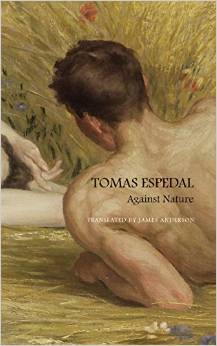
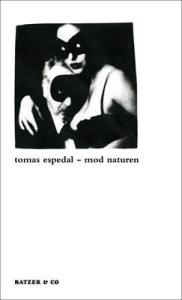
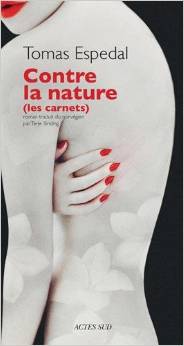
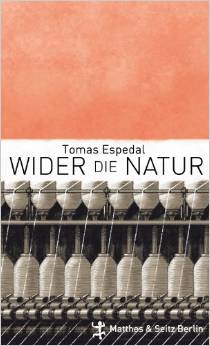
The Seagull one is based Auguste Levêque's Idylle d'été -- but cropped like this maybe doesn't quite suggest enough ?
In any case, it seems to me this is yet another example very much in support of the plainest of covers -- like the Norwegian one ... (though that cover-color is maybe less than ideal ...):
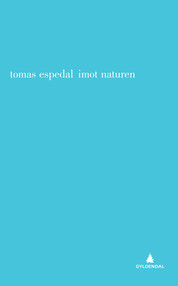
- M.A.Orthofer, 15 May 2015
- Return to top of the page -
Against Nature:
- Seagull Books publicity page
- Actes Sud publicity page
- Matthes & Seitz publicity page
- Ponte alle Grazie publicity page
- Gyldendal publicity page
- Gyldendal information page
- Afternposten (Norwegian)
- The Book Binder's Daughter
- ChronicaLibri (Italian)
- Clara et les mots (French)
- Dagbladet (Norwegian)
- Deutschlandfunk (German)
- Deutschlandradio (German)
- Jens Drejer (Danish)
- Fixpoetry (German)
- Inga Ganzer (German)
- Kristall (German)
- Lesarten (German)
- Litteratursiden.dk (Danish)
- Messenger's Booker (and more)
- Neues Lesen Skandinavien (German)
- Neue Zürcher Zeitung (German)
- Politiken (Danish)
- Rose-Maries litteratur- og filmblogg (Norwegian)
- Sätze&Schätze (German)
- Tages-Anzeiger (German)
- Time's Flow Stemmed
- Vårt Land (Norwegian)
- Die Zeit (German)
- See Index of Scandinavian literature
- Return to top of the page -
Norwegian author Tomas Espedal was born in 1961.
- Return to top of the page -
© 2015-2019 the complete review
Main | the New | the Best | the Rest | Review Index | Links







